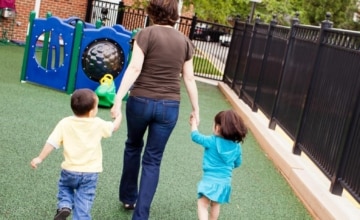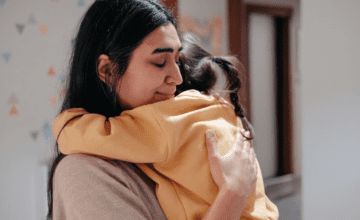The practice of mindfulness is increasingly in the news and its use is growing in popularity across many different settings—from health to education.
Mindfulness interventions have indeed demonstrated positive benefits for focus, attention, and various aspects of well-being for professionals, parents, and even children, and have sparked attention because of their perceived effectiveness and relatively low cost of implementation.
Knowing the first 3 years of life are critical for healthy child development, ZERO TO THREE asked: How could the practice of mindfulness be used to improve outcomes for young children? We reviewed more than 100 resources including both academic research and popular press items. All articles addressed the use of mindfulness practice as it applies to parents, educators, or children. While mindfulness training for children has been implemented in a variety of school settings, very little of the research focuses on children under 5 years old. For that reason, we narrowed our review to focus on the use of mindfulness practice for parents and educators, and specifically on how mindfulness training for adults might reduce parent/caregiver stress and improve the quality of adult–child relationships.
The results are encouraging. Research on mindful parenting and mindfulness-based interventions (MBIs) for parents and teachers is growing. Studies have consistently established results that suggest benefits for both the adult practitioners and the children in their care. The findings of the literature review indicate a growing base of evidence showing that mindfulness and MBIs are promising pathways to positively impact both caregiver and child outcomes.
Research on Mindful Parenting
Research on mindful parenting has focused on two different aspects of mindfulness, dispositional mindfulness and the impacts of MBIs. Research focused on dispositional mindfulness refers to a parent’s awareness of and attention to what they are thinking and feeling in the moment. A study of 485 parents investigated how parent dispositional mindfulness relates to parenting practices. The study indicated that higher dispositional mindfulness leads to higher levels of mindful parenting interactions. The use of mindful parenting practices overall leads to higher levels of positive parenting practices and lower levels of negative parenting practices (Parent et al., 2016), supporting healthy child development and positive outcomes.
Research on specific MBIs explore the effects of teaching mindfulness to parents. Studies have looked at parental well-being and the quality of the parent–child relationship as they relate to the use of MBIs. Researchers have also explored the effects of MBIs during specific periods, such as the pre- and perinatal periods. Studies focusing on the prenatal period have found early evidence that mindfulness practice during pregnancy is associated with decreases in self-reported pregnancy anxiety and increases in mindfulness; another study found that mindfulness practice in the prenatal period was associated with decreased reports of postpartum depression. Studies focusing on MBIs in the perinatal period provide preliminary evidence supporting the use of these interventions as a means of reducing new parents’ stress and facilitating positive infant development in the immediate period after birth. Another small, but growing, body of evidence indicates that MBIs have great potential to support parents of children with special needs. Impacts demonstrated for these parents include reductions in stress and anxiety and greater satisfaction with parenting.
Across studies, MBIs have been shown to improve focus, attention, and decision-making skills in low-income parents, increase mothers’ use of mindful parenting, and enhance relationships between parents and adolescents.
Research on Mindful Teaching
When considering the benefits of mindfulness training for teachers, it is important to acknowledge work-related stress and its impact on educators’ abilities to respond effectively to children. Teachers’ work lives are “saturated with interactions with students, colleagues, administrators, and parents” (Roeser, Skinner, Beers, & Jennings, 2012, p. 2) that require constant shifts of attention from individual student’s cognitive and emotional needs to the larger group, and back again. Problem-solving happens on the fly, and self-regulation is a must. Teachers don’t have the opportunity to leave the classroom to compose themselves after a distressing interaction.
Despite this demanding work environment, maintaining a sensitive, attuned relationship with each child in one’s care is crucial. Research has shown that “children’s scores of security with their child care teachers in toddlerhood were … the most important predictor of the quality of their relationship with a teacher in the elementary grades” (Howes, Hamilton, & Philipsen, 1998, as cited in Shine, 2016, p. 65). The relationship between a child and his teacher during early childhood sets the stage for the learning that follows. Mindfulness training for teachers seeks to improve teachers’ well-being and the relationship between teacher and child. A 2012 meta-analysis (Meiklejohn et al.) reviewed research about the integration of mindfulness training into K-12 education. Three studies of mindfulness-based training for educators established significant and positive results. Mindfulness-Based Wellness Education increases in teacher mindfulness and teaching self-efficacy. Cultivating Awareness and Resilience in Education (CARE) found that teachers demonstrated a classroom orientation that better supported the development of intrinsic motivation in students after mindfulness-based training, and Stress Management and Relaxation Techniques in Education established a positive influence on teachers’ interactions with students and co-workers.
In 2017, Jennings et al., revisited the impact of the CARE program on classroom outcomes. CARE was administered as “a 30-hour mindfulness-based training for teachers spread out over a 4-month period.” The program focused on a large (224 elementary school teachers) sample in an urban, low-income, high-risk setting (New York City). The study included blind classroom observations. Experimental classrooms scored higher for emotional support, positive climate, and teacher sensitivity, with gains in classroom organization and productivity as well (Jennings et al., 2017).
Recommendations for the Use of MBIs in the First 5 Years
In reviewing the literature on the use of MBIs with parents and teachers, the following recommendations emerged from the current evidence base:
1. Provide mindfulness training for parents and child care professionals to support their well-being and improve outcomes for children. Mindfulness interventions for early childhood professionals and parents of young children offer promise in helping adults become more sensitive and attuned caregivers. Adults who practice mindfulness report experiencing fewer effects of stress. They also report enhanced self-regulation, and are thus better able to assist children in recognizing and learning to manage their own strong emotions. Through mindfulness practice, adults can learn to acknowledge difficulties without immediately reacting, honor the child’s perspective, and respond with care and compassion for themselves and the child.
2. Institute approaches that help shift organizational environment and culture to better support mindfulness practice for professionals. Many of the MBIs addressed in our literature review involved a commitment of time from the organization and individual participants, for example, weekly sessions for 8 weeks. A survey of ZERO TO THREE members conducted in 2018 identified “not enough time or resources” as the biggest barrier (54% of respondents) to implementing mindfulness in the workplace (ZERO TO THREE, 2018, p.5). Developing a robust mindfulness practice in an early childhood setting is not a “one-and-done” professional development effort. Embracing mindfulness is a long-term commitment. We recommend mindfulness approaches that encourage professionals to practice mindfulness as part of their everyday work. In addition, organizations should consider strategies to offer staff ongoing support and guidance on the use of MBIs through systems such as communities of practice.
3. Continue research on the impact of MBIs on early childhood professionals and parents of young children. More studies are needed to further understand the role of mindfulness in adult–child interaction as well as the impacts of mindfulness on parenting, caregiving, and teaching very young children (under 5 years old). Research is also needed to identify effective mechanisms for increasing mindfulness in adult caregivers, particularly among diverse cultural groups.
ZERO TO THREE’s work on the role of mindfulness in early childhood education is just beginning. You can watch for updates and learn more at www.zerotothree.org/mindfulness







